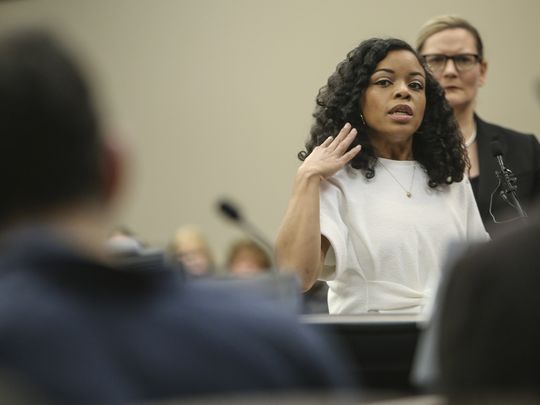Msu Trainers Knew Nassar Issues but Are Still on Job, Ex-athletes Say
By Gina Kaufman and Joe Guillen
“Right out of the gate, I said, ‘This is so weird, like this man is not using gloves, like is that weird or is it just me?’” Lopez said. “I was always questioning.” Lopez’s first trainer, who she said she talked to about Nassar, no longer works for MSU, is not named in any lawsuits and declined to comment when reached. Lopez said she also confided in another trainer, Hadden, during a spring break trip in Florida. In a hotel room, Hadden was treating Lopez with stretches and massages, but the pain Lopez was suffering wouldn’t go away. She said she described to Hadden the procedure Nassar performed. “Her face got really bright red; she started to cry,” Lopez said. “I started to cry because I felt, like, 'are you joking? You feel like this isn’t appropriate, so I shouldn’t have been doing this this entire time?' ” Hadden, Lopez said, told her to talk to Teachnor-Hauk. But Lopez put that conversation off. About a week later — Hadden came back with an explanation for Nassar’s treatment, using a model of a pelvis to describe that he penetrates her to manipulate a bone. Lopez continued her appointments with Nassar. During her last appointment with Nassar, Lopez said Hadden was there, holding her hand. “I’m in tears, I’m shaking, I’m crying, I’m in tears because I don’t want to be there,” Lopez said. Lopez said she stopped the appointment, hopping off the table and leaving. She said she heard Nassar ask: “What’s wrong with her?” “I didn’t wait around for an answer,” she said, “and I never went back to the doctor.” That year, in 2000, Lopez said she took her complaint about Nassar to Teachnor-Hauk. During a meeting with Teachnor-Hauk on the bleachers in Jenison Field House, the trainer told Lopez that the procedures Nassar performed were medical treatment. “I felt like she didn’t believe me,” Lopez said. “She called me crazy; she told me I was crazy for thinking that … the treatment that I had been receiving this entire time wasn’t, like, actual medical treatment.” She said Teachnor-Hauk told her that filing a complaint would draw attention to the school and herself and would be a burden on her family — a reference, Lopez said, to her stepmother recently passing away. In that same meeting, Lopez decided to declare herself medically inactive, ending her collegiate softball career. She said she was offered a position to stay with the team. Her athlete profile, which can still be found on the MSU Athletics Department website, says she would be spending her third and fourth years as an undergraduate assistant coach after retiring with an injury. But, instead, Lopez quit school and went home to California. Siding with Nassar James White, an Okemos-based attorney who is representing several women in lawsuits against the university, said Nassar was repeatedly believed by people, including employees such as the trainers, over women alleging abuse. This, he said, is inexcusable. "Here, there was an immediate deference to the individuals whom allegations have been made against," White said. "I think that's inappropriate and it's reckless." Manly, who represents Lopez, said he is unsatisfied with MSU's response. “The message that sends is either that we don’t believe you or we don’t care,” he said. Former MSU volleyball player Jennifer Rood Bedford also has said she informed Hadden in the early 2000s that something felt wrong after her treatment from Nassar. Bedford was among the many women and girls who gave victim impact statements during Nassar's sentencing hearings earlier this year. In court, she recounted how she had feared harming the reputation of a potentially innocent doctor, but ultimately decided back then it was important to report her experience.
She asked Hadden about filing a general complaint. Hadden asked her whether she thought Nassar had done something criminally wrong and whether he hurt her. Bedford said she held back details. “All I wanted to do was say, ‘I’m uncomfortable’ and to have that heard and recorded with the small hope that I wasn’t alone,” Bedford said in Ingham County Circuit Court in January. Hadden, she said, wanted to make sure she realized what filing a report could entail. “An investigation, making an accusation against Nassar, and stating that I felt that he did something unprofessional or criminally wrong,” Bedford said. “I had a hard time saying that with certainty.” Bedford did not file a report but instead came up with a strategy to confront the doctor if he ever treated her again and made her uncomfortable. In all, more than 200 girls and women have come forward to report that Nassar abused them during a time frame that spans decades. Nassar will spend the rest of his life in prison. He was sentenced to several decades in state prison, but before that he must complete a 60-year federal prison sentence for possession of child pornography. Lindsey Lemke, a former MSU gymnast who said she was sexually assaulted by Nassar, questioned why trainers who had been informed about Nassar would be allowed to continue working with athletes. Lemke said she had to take a medical disqualification from competing this year because of injuries, but was still working with the team as a student coach. In that position, she regularly saw Teachnor-Hauk, who is the team’s trainer. “If someone’s being investigated for knowing about sexual assault, you should be suspended,” Lemke said in an interview with the Free Press. Those aware of complaints against Nassar, Lemke said, could have prevented future abuses — including her own — had they spoken up years ago. “I think the main thing that’s frustrating,” she said, “is the enablers who have not been held accountable.” Contact Gina Kaufman: 313-223-4526 or gkaufman@freepress.com. Follow her on Twitter: @ReporterGina Contact Joe Guillen: 313-222-6678 or jguillen@freepress.com. Follow him on Twitter: @joeguillen Lansing State Journal reporter Matt Mencarini contributed to this report.
|
.
Any original material on these pages is copyright © BishopAccountability.org 2004. Reproduce freely with attribution.

